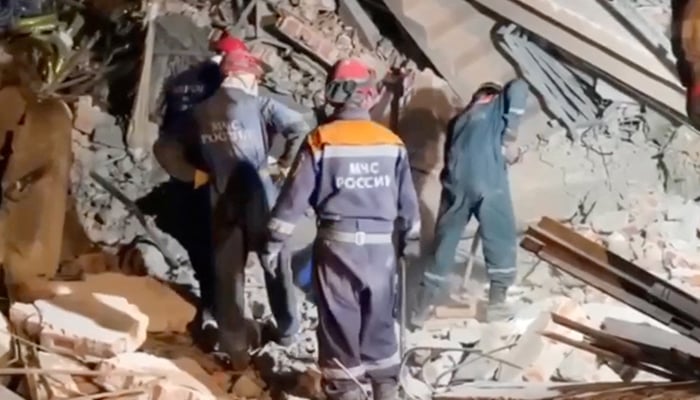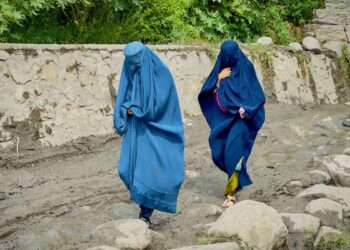Select Language:
BANGKOK: On Wednesday, Myanmar’s military junta reported that its forces fired warning shots at an aid convoy from the Chinese Red Cross, highlighting the difficulties in providing aid amid ongoing civil conflict. This comes as humanitarian organizations advocate for improved access to assist those affected by a devastating earthquake.
Since the military takeover in 2021, which ousted the elected government led by Nobel laureate Aung San Suu Kyi, Myanmar has been gripped by turmoil and conflict. The situation has severely damaged the economy and essential services including healthcare.
According to junta spokesperson Zaw Min Tun, the Chinese Red Cross did not notify local authorities about its operations in a conflict area on Tuesday night. The security team reportedly discharged rounds into the air when the convoy, which included regional vehicles, did not halt.
A spokesperson from the Chinese Foreign Ministry confirmed that the aid team and its supplies were unharmed, urging all parties in Myanmar to guarantee the safety of rescuers. "It’s vital to keep transportation routes for humanitarian assistance clear and operational," Guo Jiakun mentioned at a news briefing.
The warning shots were fired as Myanmar state media reported that the death toll from last Friday’s magnitude 7.7 earthquake had risen to 2,886, with 4,639 individuals injured. Many rural areas in the Sagaing region, which bore the brunt of the quake, are primarily controlled by armed resistance factions opposing the military regime, as noted by the International Crisis Group.
They added, “These areas will present substantial challenges for aid organizations due to regime constraints, fragmented local governance, and ongoing conflict.” Gathering accurate information in these regions had already been difficult before the earthquake due to a military-imposed internet and communication blackout, exacerbating the crisis.
A resident of Sagaing shared with Reuters, “Soldiers are widely present in the area. They are here for security, not rescue, and they inspect every vehicle.”
Human Rights Watch, based in New York, urged the junta to allow unrestricted access to humanitarian assistance and to remove barriers that hinder aid groups. The organization insists that donors should support independent organizations instead of solely relying on junta officials. "The military in Myanmar cannot be trusted to manage a disaster of this magnitude," emphasized Bryony Lau, the group’s deputy Asia director.
The military has refuted claims of widespread human rights abuses amid its fight against a multifaceted insurrection that arose following the coup. Rebels allege that the military has conducted airstrikes even post-quake. On Tuesday, a significant rebel coalition declared a unilateral ceasefire to facilitate relief operations.
Millions Affected
According to the United Nations, more than 28 million individuals are impacted in the six regions struck by the earthquake, with the organization allocating $12 million for emergency responses, including food, shelter, water, sanitation, mental health support, and various services.
The United Nations Office for Project Services (UNOPS) highlighted the ongoing crisis, stating, "The situation is dire, with disrupted communication and road access hindering response efforts, particularly in Sagaing."
Australia has announced an additional A$6.5 million (approximately $4.1 million) in humanitarian aid for Myanmar, which will be distributed through well-vetted international and local partners. In a statement, Foreign Minister Penny Wong asserted, "We are taking proactive measures to ensure our assistance does not lend credibility to the military regime in Myanmar."
A woman from Mandalay, near the earthquake’s epicenter, remarked to Reuters that authorities were constructing a stage for the upcoming Thingyan water festival, despite many residents being homeless and bodies left beneath collapsed structures. The military council has barred international journalists from covering the aftermath of the earthquake, citing shortages of water, electricity, and accommodation.
In neighboring Thailand, the quake’s toll rose to 22, with numerous buildings sustaining significant damage.
In Bangkok, the search for survivors continued beneath the rubble of a partially constructed skyscraper, which had claimed 15 lives with 72 individuals still unaccounted for. As part of the rescue effort, officials reassigned two rescue dogs to provide emotional support to the families of the missing. Children were seen comforting the golden retrievers clad in light-up vests at a temporary shelter, finding solace during these distressing times. Chanpen Keawnoi, whose mother and younger sister are among the missing, expressed, "As long as the dog keeps barking when it senses something, there’s hope someone may still be alive."
The government has launched an investigation into the building’s collapse, with preliminary tests indicating that some steel samples from the site were substandard.







